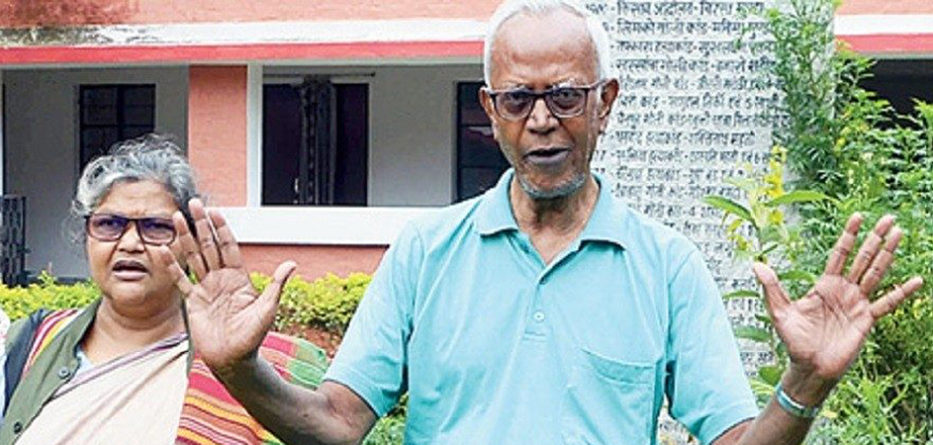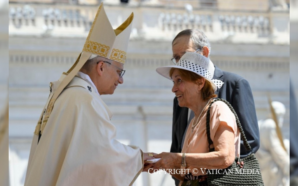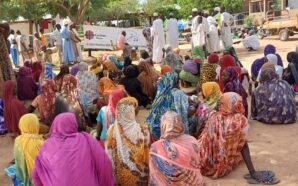It prompts us all to ask: What kind of society do we want to become?
Father Stan Swamy’s death in custody raises profound questions about India‘s commitment to humanity under Prime Minister Narendra Modi’s government.
The 84-year-old Jesuit priest and tribal rights activist died on July 5, 2021, while imprisoned under harsh anti-terror laws, triggering outrage and sorrow across the nation.
His passing resonates with the crucifixion narrative of Good Friday — both represent sacrifices made by those who challenged power structures and defended the marginalized.
Born in Tamil Nadu, Swamy dedicated over two decades of his life to the indigenous Adivasi communities of Jharkhand. He consistently opposed corporate interests that threatened tribal lands for mining and industrial projects.
His advocacy for young Adivasis unjustly imprisoned and labeled as Maoists made him a target. Despite his commitment to peaceful activism, the government perceived him as a threat to the established order.
In October 2020, the National Investigative Agency arrested Swamy, linking him to the 2018 Bhima Koregaon violence in Maharashtra. Charged under the Unlawful Activities (Prevention) Act (UAPA), the elderly priest with Parkinson’s disease faced deteriorating health in prison.
His trembling hands made basic tasks like eating and bathing impossible without assistance. The courts repeatedly denied him bail, even after he contracted COVID-19. Transferred to a Mumbai hospital in May 2021, he suffered a cardiac arrest and died weeks later — a death many believe could have been prevented with proper care or release.
Swamy’s case exemplifies a troubling pattern in contemporary India. Numerous activists, journalists, and ordinary citizens have been detained under draconian laws like the UAPA, which makes obtaining bail exceptionally difficult.
Human rights organizations report a significant increase in such arrests since Modi’s government assumed power in 2014. While authorities claim these measures combat terrorism, critics see them as tools to silence dissenting voices. That an elderly, ailing man died in custody for his advocacy work indicates the extreme lengths to which this silencing extends.
The plight of minorities in India has intensified in recent years. Muslims face mob violence over alleged cow slaughter, while legislative measures like the Citizenship Amendment Act and the National Register of Citizens create obstacles for Muslims establishing their Indian identity.
Christians encounter harassment under anti-conversion laws that require governmental permission for religious conversion — statutes ostensibly designed to prevent forced conversions but frequently weaponized against minority faiths.
Violence against women has taken disturbing religious dimensions. The 2018 Kathua case, involving the rape and murder of an eight-year-old Muslim girl in Jammu, was allegedly aimed to intimidate the local Muslim community. Political leaders’ support for the accused revealed how religious hatred can shield perpetrators. Such incidents, occurring with alarming frequency, represent a fundamental betrayal of India’s professed values.
Modi’s administration stands accused of advancing Hindu nationalism at the expense of inclusivity. Policy decisions like revoking Kashmir’s special status under Article 370 and constructing the Ram Temple in Ayodhya have galvanized Hindu supporters while alienating religious minorities. Though the government portrays these actions as unifying the nation, many perceive them as exacerbating religious divisions and targeting non-Hindu communities.
Anti-conversion legislation has proliferated across states like Uttar Pradesh and Madhya Pradesh. These laws, requiring official approval for religious conversion, have resulted in the arrests of individuals sharing their faith. Critics argue that such measures violate the constitutional guarantee of religious freedom and contribute to the ongoing harassment of minorities, reflecting governmental attempts to control personal beliefs.
While the government maintains it safeguards national security, its actions suggest alternative priorities. Laws like the UAPA and sedition statutes effectively suppress criticism, with dissenters branded as “anti-national” or “urban Naxals.” The National Investigation Agency’s insistence on keeping Swamy imprisoned despite his suffering, coupled with policies like the Citizenship (Amendment) Act and prominent Hindu temple projects, indicates a preference for power consolidation over human welfare.
Swamy’s death garnered international attention. The United Nations expressed concern for human rights defenders and urged India to release unjustly detained individuals. The United States and European Union highlighted religious freedom issues, suggesting India‘s democratic foundations were eroding. The government defended its actions as legally sound, but global reaction demonstrated that Swamy’s fate resonated beyond India’s borders.
Three years after Swamy’s death, the Indian Church has responded with varying degrees of engagement. Catholic leaders initially expressed grief, with Cardinal Oswald Gracias calling for justice. The Jesuits committed to continuing Swamy’s mission and clearing his name through legal petitions, including one filed with the Bombay High Court in 2021.
Annual memorial services on July 5 in Mumbai, Delhi, and Ranchi bring together religious and lay communities to honor Swamy and raise awareness about tribal rights and unjust legislation. Through the Bagaicha center in Jharkhand, Jesuits train young activists to advocate for Adivasi communities, preserving Swamy’s legacy.
However, some criticize the Church for insufficient opposition to governmental policies. While Catholics protested against Swamy’s arrest, the institutional Church — including the Catholic Bishops’ Conference of India — remained relatively quiet. This restraint extends to confronting anti-conversion laws and religious persecution.
Some clergy and activists demand more assertive action reflective of Swamy’s courage, while others cite political tensions as justification for caution.
In 2023, certain bishops addressed human rights at conferences and supported tribal communities through education and legal assistance. The Jesuits’ back campaigns against UAPA, and Swamy’s example inspires younger priests to serve marginalized populations. The Church navigates between institutional self-preservation and fidelity to Swamy’s bold witness.
Swamy’s narrative serves as a cautionary tale for contemporary India. His death — sick, imprisoned, and neglected despite a lifetime aiding the vulnerable — connects to broader issues of persecution, religiously motivated violence, and anti-minority legislation.
Like Jesus on Good Friday, Swamy’s fate demonstrates how power structures can crush those dedicated to justice and compassion. Though the government claims legal justification, laws should never compromise fundamental rights and human dignity. India’s Constitution guarantees equality and freedom, yet many citizens experience neither.
Swamy’s death mirrors India’s current condition, as does the crucifixion narrative. Arbitrary arrests, religious hatred, and institutional silence reflect a nation losing its moral compass. When citizens sent sippers to Swamy in prison because he couldn’t drink independently, they expressed a fundamental concern for humanity that demands broader application. India must confront whether it values every life equally or allows fear and division to prevail.
The path forward requires governmental restraint in silencing critics, genuine protection for minorities, expedited judicial processes, a more vocal Church, and citizens demanding humane treatment for all. Without such changes, more will suffer Swamy’s fate, and India’s commitment to humanity will continue to diminish.
Swamy’s death prompts us all to ask: What kind of society do we want to become? Will we honor the sacrifices of those who stand for justice, or will we remain complicit in systems that punish compassion? The answer lies not merely in memorializing Swamy, but in transforming the conditions that led to his tragic end.
*The views expressed in this article are those of the author and do not necessarily reflect the official editorial position of UCA News or Catholic Outlook.
With thanks to the Union of Catholic Asian (UCA) News and John Singarayar, where this article originally appeared.








